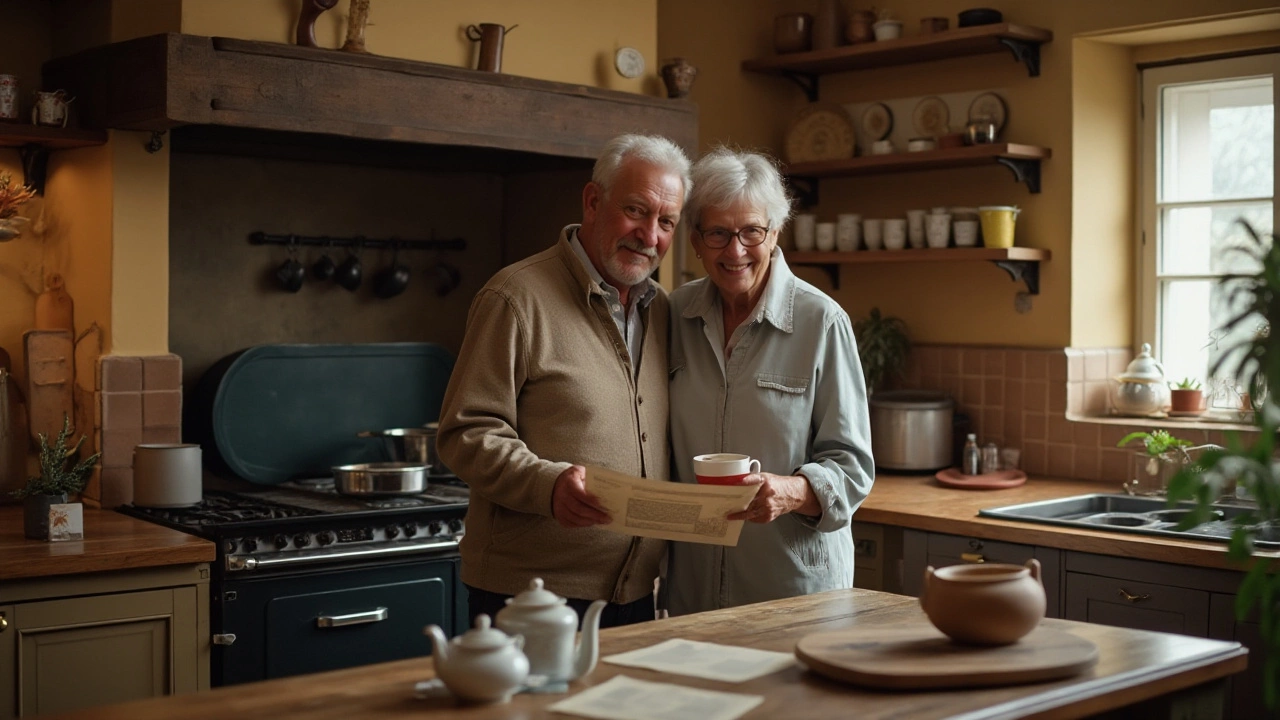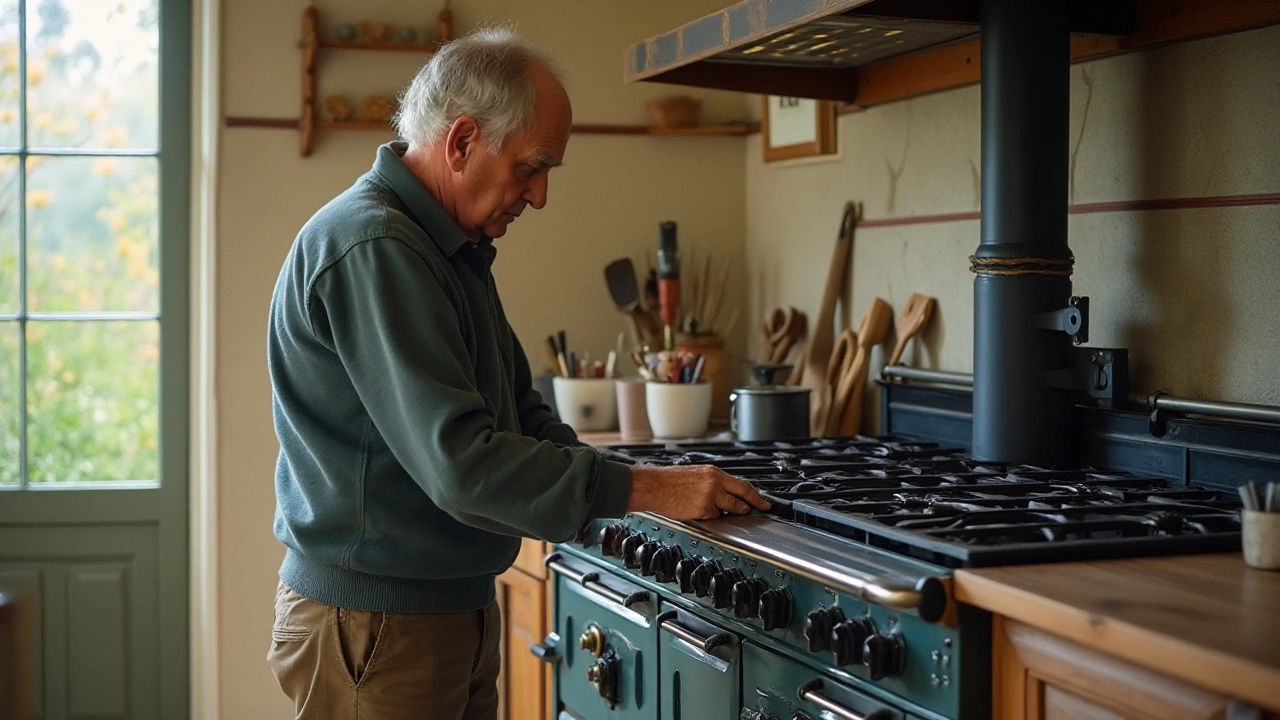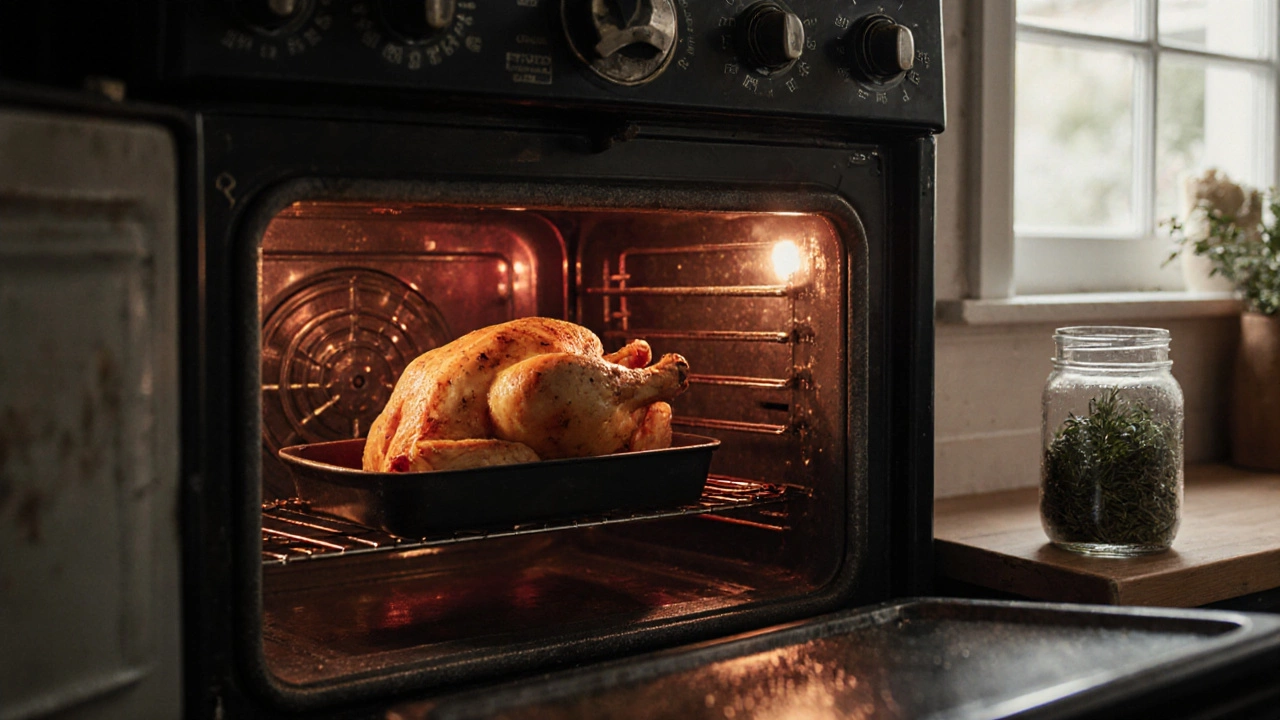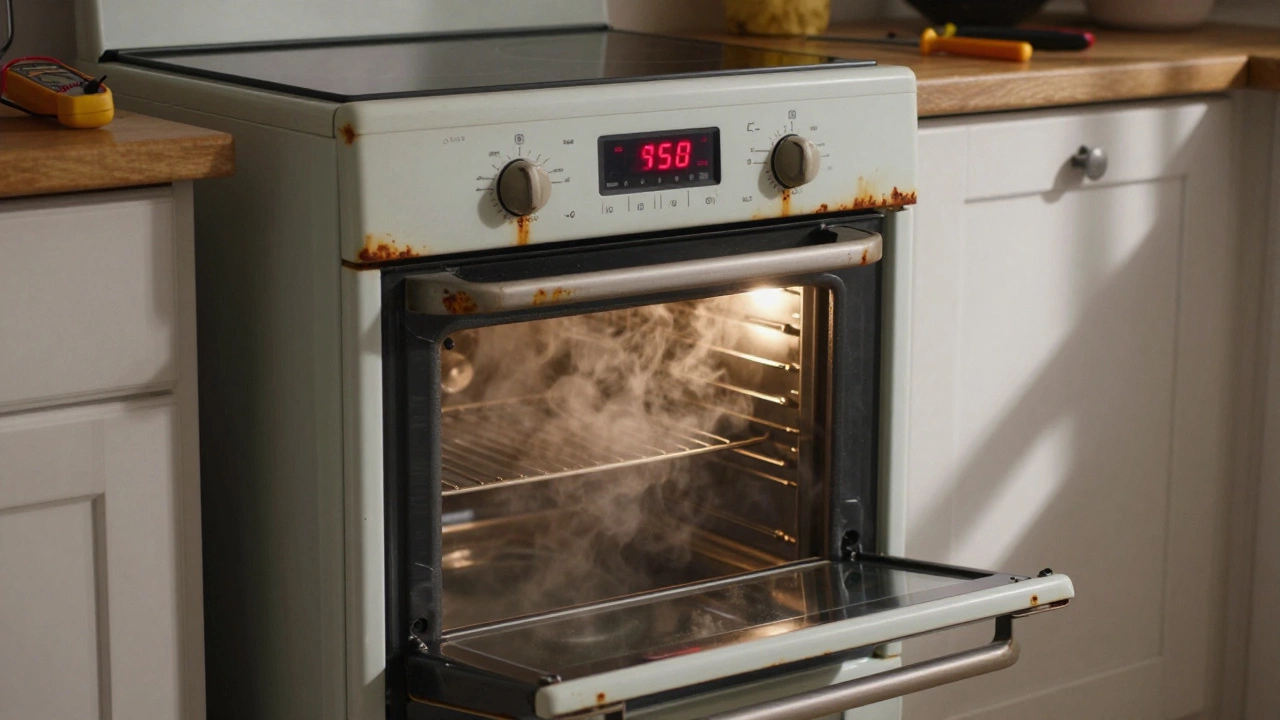
- 5 Oct 2024
- Gideon Thornton
- 0
Kitchens are the heart of many homes, bustling with activity and the delicious aromas of home-cooked meals. At the center of this culinary stage often sits the stalwart range oven. But like any unsung hero, it too has its limitations. How long should you expect your electric range oven to last before it throws in the towel? That's what we're here to uncover.
Electric range ovens are marvelous machines, yet they're not immune to the wear and tear of regular use. A little bit of knowledge about what affects their lifespan can go a long way. With mindful care, understanding the tell-tale signs of an issue, and knowing when it's time to bid farewell, you can ensure your trusty kitchen companion serves you faithfully for years to come.
- Introduction to Range Ovens
- Factors Affecting Lifespan
- Signs Your Oven Needs Repairs
- Maintenance Tips
- When to Consider Replacement
- Interesting Facts About Range Ovens
Introduction to Range Ovens
When you step into the world of kitchen appliances, the range oven stands as a true staple. This versatile kitchen marvel combines both an oven and a cooktop in a single unit, making it a central player in meal preparation. In homes across the world, range ovens have become indispensable as culinary sidekicks, offering both familiarity and functionality. The modern range oven can trace its origins back to the late 19th century, revolutionizing how families cooked and adding a touch of innovation to everyday homes. By marrying the functionalities of a stove and an oven together, it streamlined cooking, saving space and effort.
Most homes today feature electric range ovens due to their ease of use and precise temperature control. Whether you're simmering a cozy stew on a cold winter's evening or baking grandma's secret cake recipe to perfection, the electric range oven ensures each creation is cooked evenly and thoroughly. Notably, these appliances have evolved significantly, now boasting conveniences such as self-cleaning mechanisms and digital controls, which were unheard of a few decades ago. An interesting fact from the Department of Energy states that approximately 37% of American households use electric ovens as of 2021, showcasing their widespread popularity.
"The journey of a thousand meals begins with a single reliable oven," says James Peters, an expert from the Culinary Institute of America, underscoring the inextricable bond between home-cooked meals and sturdy, dependable appliances.
Efforts to improve the efficiency of range ovens continue, optimizing energy use and reducing operational costs. Many newer models even incorporate smart technology, allowing cooks to preheat their ovens from the comfort of their smartphones. With features like these, cooking becomes not just a chore, but an experience. These endless developments guarantee that range ovens will remain a mainstay in kitchens everywhere, as they adapt to the growing needs of modern life while keeping the essence of home cooking alive. Thus, recognizing the central role they play, it becomes essential to treat these appliances with care, ensuring they last long.
Factors Affecting Lifespan
Your electric range oven's lifespan isn't plucked randomly from a shelf; it's influenced by various factors that can either extend or shorten its years of service. Understanding these factors not only prolongs the life of your appliance, but it also saves you from the inconvenience and expense of frequent repairs or early replacement. So what are these key elements that play a part in how long your range oven lasts?
First off, consider the frequency of use. Like a car clocking miles, ovens also have a kind of mileage based on how often they are put to use. An oven that roasts and bakes daily will wear out faster than one that sees action only on weekends or holidays. It's essential to be mindful of overworking your oven. Give it breaks just like you would any other hard-working member of your kitchen crew.
Quality of installation is another pillar supporting the longevity of your oven. A range oven, if not installed properly, can lead to frequent malfunctioning. Proper leveling is crucial; an uneven oven can lead to imbalanced baking and even damage the appliance. An expert installation mitigates these risks, ensuring everything is connected correctly, reducing wear and tear right off the bat.
According to kitchen appliance expert, Jane Winslow, "Proper installation not only optimizes the performance of your oven but significantly might add to its years."
Material quality also matters. Ovens constructed with high-grade metals and heat-resistant components tend to chew through time much better than cheaper alternatives. Checking for a reputable brand with durable parts might cost more initially, but it usually pays off in fewer repairs and a longer lifespan. Make sure to review the manufacturer's reputation and look for warranties that demonstrate their confidence in the product's durability.
Another crucial factor is maintenance. Regular cleaning and inspection keep an oven functioning smoothly. Accumulated grime and grease not only host bacteria but also can impede an oven's heating elements and fan operations. Using the self-cleaning function of the oven, when done properly, can help preserve both the esthetics and functionality of your appliance. However, be cautious as excessive self-cleaning can sometimes damage the oven.
Don't underestimate the type and quality of cookware used with your oven. Heavy-duty pots and pans require longer to heat and can stress the oven's components over time. Choosing cookware that complements your oven's heating capabilities reduces stress on the appliance.
An unexpected factor often overlooked is the power source. Sudden power surges or inadequate voltage supply can adversely affect an oven. For those living in regions with unstable electricity, investing in power surge protectors can safeguard your oven's electronics from damage, extending its lifespan significantly.

Signs Your Oven Needs Repairs
Even the most reliable range oven in your kitchen will eventually display signs that it needs a bit of TLC. These incidents often begin subtly, signaling issues that may lead to failure if not addressed promptly. One such sign is uneven cooking or baking. If you've noticed that your cakes come out with one side overcooked while the other remains raw, it's likely an indication of a heating element malfunction. This issue could be due to a faulty thermostat or a burned-out element that requires a timely repair to restore uniform heating inside your trusty oven.
Another key signal is if your oven takes longer to preheat than it once did. While this might seem trivial on its own, it could point towards a larger underlying problem. Often, this slowdown is because of a defective temperature sensor. Keeping your electric range oven in pristine condition not only ensures delicious meals but also maintains energy efficiency, keeping those energy bills in check. This efficiency is vital, especially as it can contribute to lowering your carbon footprint.
According to the U.S. Department of Energy, appliances account for approximately 13% of your household’s energy use with the oven being one significant contributor.
You should also be wary of unusual noises. Besides the hum of routine operation, odd sounds like ticking or whining might be an alarm for parts that are about to give way. Such noises often emanate from a fan motor or worn-out bearings needing immediate attention. An unchecked motor issue can eventually deteriorate and transform into a larger problem, affecting other components and shortening your oven's expected lifespan, not to mention increasing repair expenses significantly if not addressed promptly.
Visual Indicators to Watch
Visible signs like a malfunctioning display or knob can also indicate it's time to consult a professional before things turn catastrophic. Modern electric ovens often rely on digital controls, which, when they malfunction, provide clues that repairs are needed. If these control panels flicker or fail to light up, it could be a wiring or fuse issue necessitating expert help. Ignoring these signs can lead to sudden failure and inconvenience your daily routine at the most inopportune moments.
The smell of gas or burning rubber is another sign that you should never ignore. While it might feel obvious, it bears repeating: don’t attempt to light or repair an appliance in this condition. Unpleasant smells are often related to loose connections or a wire burning out within the oven. Give your oven a sniff test every now and then—the sooner you catch these issues, the simpler and safer the repair might be. These signs not only ensure longer durability but also safety in your household, keeping potential hazards at bay.
Maintenance Tips
Keeping your trusty range oven lifespan at its peak performance often boils down to simply giving it a bit of tender loving care. These workhorses of the kitchen are subject to all manner of spills, splatters, and scorchers, each of which can chip away at their efficiency and lifespan if not addressed timely. Regular maintenance is the key to ensuring your oven doesn't give up the ghost prematurely, sparing you from unexpected disruptions during family dinners or special feasts.
First up, let's talk cleaning. Your oven really benefits from a regular splurge of cleanliness. When grease and grime build up, they can act as insulators, holding heat longer in places where it shouldn't be, and causing wear on parts not built to bear it. After each use, giving the oven a good wipe down, ensuring to target those sneaky corners where residues love to hide, can go a long way. For a deep clean, consider using a non-toxic oven cleaner every few months or whenever you notice residue build-up persisting.
Annual Check-ups
Treating your oven to an annual check-up isn't over-the-top either. Often, minor issues aren't noticeable until they snowball into bigger, more costly repairs. A professional can inspect critical components like the heating elements or electrical connections and flag potential problems early on. Keeping these parts in top shape plays a monumental role in extending your oven's life expectancy. It's like tuning up a car; even if it sounds fine, the engine needs a once-over now and then to keep humming smoothly.
As the International Association of Appliance Manufacturers states, "Regular maintenance can extend appliance life by up to 20%, helping you maximize value from your initial investment."
Don't overlook the oven door seal either, the often forgotten guardian of heat. When the seal is compromised, heat escapes, and your oven compensates by working harder, pushing elements like the thermostat and heating coils to the brink. A quick feel around the door's edge while the oven is on should reveal any heat leaking through. If it is, a simple replacement of the seal might be all that's needed to rein in the escape.
Electrical Connections
From time to time, checking the strength of your oven's electrical connections is very important too, particularly if you've had issues with blown fuses or flickering lights. A loose connection can become a major hazard, not just for your range oven, but for your home. It's advisable to have a qualified technician make these checks unless you're very confident dealing with electrical installations. Keeping this in check ensures your electric oven repair needs are minimized, saving you both time and money.
Finally, never underestimate the power of good ventilation when using your oven. A well-ventilated kitchen helps in dissipating extra heat and odors that can cause stress to the oven's components. Whether it's through a range hood or simply opening a window, allowing heat to escape helps maintain an environment where your oven can operate without undue strain. Following these maintenance tips can significantly extend your range oven's functionality and save you from the bother of frequent overhauls or replacements.

When to Consider Replacement
At some point in the symphony of daily baking and cooking, the time may come to say goodbye to your trusty range oven. So, when exactly is it time to consider getting a new one? A good rule of thumb is to keep an eye on your appliance’s age. If it's creeping past the decade mark, start paying closer attention. Many electric range ovens have an expected lifespan of around 13 to 15 years if well maintained. But age isn’t the only factor in the equation. Like an old friend who seems a bit worn out, even a five-year-old oven might need replacing if it has been used exceptionally intensively.
You might also notice performance issues that don’t resolve with simpler electric oven repair solutions. If your cakes come out more charred than golden or your roasts emerge half-baked, your oven's heating elements might be failing. These signs can mean that even after attempting a fix, the core components are too far gone. The moment it's costing more to fix than its value, a new oven's future might be closer than you expect.
Certain repairs can cost quite a bit, so weigh those costs against what a replacement might cost. Suppose you’re consistently having to mend unreliable burners or deal with broken knobs. In that case, the convenience of a reliable new unit might save you trouble in the long run. As succinctly put by Betty Furness, 'Appliances in good order can help the house go on smoothly, but a faithful old appliance on the fritz spells major annoyance for the homemaker.' Regular breakdowns can often justify the splurge on something new and dependable.
Take into account the efficiency of your machine as well. Energy standards have climbed throughout the years, and that clunker might be quietly racking up your electricity bill. Sweeping upgrades in energy efficiency mean newer models often outperform older ones in cost savings. Range oven lifespan can be longer but weigh against those utilities’ savings. It’s worth jotting down the current model’s efficiency score and comparing it to newer options. You may find a new appliance might eventually pay for itself with reduced monthly costs.
Additionally, consider your own needs. Have they changed since you originally brought that oven home? Maybe you need something larger for a growing family or smaller now that the nest is empty. Does the existing model meet your current expectations or does it feel outdated? Today's ovens can be equipped with a smattering of helpful features—like convection settings, smart technology, and self-cleaning functions. All rare in models older than a few years, they can vastly improve the cooking experience.
While sentimentality might make parting with an old appliance challenging, remember that investing in a new oven can reinvigorate how you feel in the kitchen. Once you notice those frequent repairs or begin to experience reduced performance, it's worth asking yourself if the stove is holding up its end of the bargain. Our range ovens are as much a part of our daily culinary lives as the recipes we concoct. Ensuring they are up to the task can make all the difference in your modern cooking experience.
Interesting Facts About Range Ovens
Have you ever paused amidst the bustle of preparing dinner to wonder about that faithful piece of equipment, your range oven? There's more to this kitchen companion than meets the eye. For instance, did you know that the concept of the range oven dates back to the early 1800s? In those days, people were just discovering the joys of stove cooking as it transitioned from open hearths to something resembling modern ovens. This innovation not only revolutionized cooking but also freed many families from the precise chore of maintaining a fire.
Another intriguing tidbit is that today's electric oven repair industry has significantly benefited from technological advancements in oven manufacturing. Modern range ovens are equipped with sophisticated electronics that allow for precise temperature control, enhancing not just the quality but also the consistency of the dishes you prepare. However, these advancements also mean that the demand for skilled technicians who can navigate these complexities when repairs are needed has risen. Recognizing this need, many manufacturers offer extended warranties and support services, giving users peace of mind with this blend of technology.
Interestingly, while your average range oven may seem like an innocuous appliance, it actually consumes a significant amount of energy. In fact, experts state that an oven can be one of the most energy-intensive devices in a household. To put this into perspective, some organizations suggest that using an oven efficiently can cut down your energy bill noticeably. Simple habits like cooking multiple dishes at once and keeping the oven door closed during use can go a long way in saving energy. Did you know that every time you open the oven door, the internal temperature drops by about 25 degrees? This might necessitate additional cooking time and, consequently, more energy use.
"Today's consumers are more conscious than ever about energy efficiency. Owning an energy-efficient range oven isn't just better for the planet, it's a smart financial decision," notes Maria Robinson, an expert in kitchen appliance design.
Finally, let's not forget the role of aesthetics. Modern range ovens come in an array of colors, styles, and finishes, no longer limited to the basic white or black. This trend has allowed them to serve as both functional and visually appealing centerpieces in contemporary kitchens. Some people even choose their appliances based on how well they complement their kitchen design. The exterior beauty of these machines often belies the robust functionality that lies beneath, showing that practicality doesn't have to come at the expense of style.




